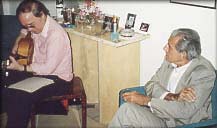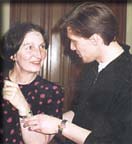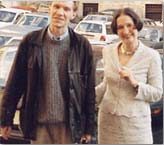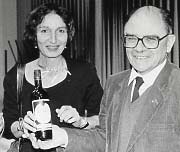|
Vladimir Boukovski
« I’m neither of the reactionary camp nor of the revolutionary camp, I’m from the concentration camp »: it was the first utterance of Boukovski, symbolic figure of Soviet dissidence, when released from the mental hospitals and Lefortovo prison in exchange for Chilian communist unionist Corvalan in 1976, before the (already hemiplegic) news media of the free world, which had no other question to ask except whether he was from the left or right wing! Much later French TV dared to put him opposite the director of a Communist newspaper… as if a former deportee of a Nazi concentration camp would have anything to discuss with the director of the Nazi magazine Je suis partout ! Nikita Krivochéine lent me his apartment so that I could be one of the first to do an interview with Boukovski in London. He just forgot to tell his friend Telnikov who had the keys for watering the plants. When Telnikov wanted to help Boukovski to escape journalists, he thought that the best way was to hide him in Nikita’s « empty » flat. And Boukovski, just arriving from the KGB prison found himself looking at a woman in a black sexy night négligé inviting him graciously to take her room, while she packed her bags. He never believed that I was not a « créature » sent by the KGB. So, I was the only journalist there not having an interview with him! When the book, Droit d’asiles en Union Soviétique (« The Right of Asylums in the Soviet Union), was published, he understood that he had been wrong and gave me a scoop interview for the newspaper I was working for at the time, VSD. He lives in England, and I never saw him again. But I read his books, and he’s one of the bravest and brightest human beings who escaped our Eastern friends’ claws. Then he was submitted to the shock of a Western world, accomplice or inane. But that’s another story…
Giovanella Bruno di Belmonte (cf. Savignano)
Diko Byzanthios
 Greek painter (here, in the photo, listening to the Greek songs of William Skyvington), friend of Ionesco and Jean-Paul Aron, Diko was, years ago, the good companion of delightful dinners and chats. Eternal lover of beautiful women, of fashion and art, he deplored the disappearance of ‘ennui’, the only warrant for him of love, and probably he was right. Greek painter (here, in the photo, listening to the Greek songs of William Skyvington), friend of Ionesco and Jean-Paul Aron, Diko was, years ago, the good companion of delightful dinners and chats. Eternal lover of beautiful women, of fashion and art, he deplored the disappearance of ‘ennui’, the only warrant for him of love, and probably he was right.
Jérôme Caillot
  G-ROM (here at the Sorbonne, the day of my thesis, and then in Rome for the presentation of our CD) taught me everything about the mystery and lingo of computers, in a distant place in the remote suburb of Montreuil. For the whole year, we worked together on that CD about the Company of Jesus, that took so much effort, creativity, and looks very much like an initiatory path in our lives. We lived together, in the same house, working entire nights, not even meeting each other or exchanging a word, for days. At the end of it, we were invited to fly to a spot near Rome, and shared there days of wonder and fun. It represents, till now, one of the richest and most moving adventures of my life, with a man who never looked at me – except through screens. Because Jérôme is not only a wonderful “developer”, able to find a solution to any problem (and, believe me, I’m good at inventing a lot of new technical puzzles), but also one of the most learned interlocutors with whom I had the opportunity to exchange ideas. G-ROM (here at the Sorbonne, the day of my thesis, and then in Rome for the presentation of our CD) taught me everything about the mystery and lingo of computers, in a distant place in the remote suburb of Montreuil. For the whole year, we worked together on that CD about the Company of Jesus, that took so much effort, creativity, and looks very much like an initiatory path in our lives. We lived together, in the same house, working entire nights, not even meeting each other or exchanging a word, for days. At the end of it, we were invited to fly to a spot near Rome, and shared there days of wonder and fun. It represents, till now, one of the richest and most moving adventures of my life, with a man who never looked at me – except through screens. Because Jérôme is not only a wonderful “developer”, able to find a solution to any problem (and, believe me, I’m good at inventing a lot of new technical puzzles), but also one of the most learned interlocutors with whom I had the opportunity to exchange ideas.
André Calles
 André was of a Russian type, something like the lazy Oblomov. After having published a best-seller, How to live beyond your means without any problem, which the taxman considered so clever that the book was seized, Calles spent the last years of his life making us wait for a mythical manuscript on the History of the Trans-Siberian. But, above all, there were a number of us delighted by the sallies of one of the last ‘womenloving men of easy virtue’ of the century, courted for his shrewdness, his jokes and his address book. The director of Newsweek, a former advisor of President Kennedy, a fashion designer, some “dames de Coeur” became infatuated with him. We met at the very fashionable Moulin d’Andé, where Frederic de Towarnicki drove me once, and, later, at a ball given by the treasurer of the Communist Party in Paris, and we became good friends. In private, he was nice but also misanthropist and melancholic. We had a wonderful time in his little house of Gisors and, later, in Ramatuelle … André was of a Russian type, something like the lazy Oblomov. After having published a best-seller, How to live beyond your means without any problem, which the taxman considered so clever that the book was seized, Calles spent the last years of his life making us wait for a mythical manuscript on the History of the Trans-Siberian. But, above all, there were a number of us delighted by the sallies of one of the last ‘womenloving men of easy virtue’ of the century, courted for his shrewdness, his jokes and his address book. The director of Newsweek, a former advisor of President Kennedy, a fashion designer, some “dames de Coeur” became infatuated with him. We met at the very fashionable Moulin d’Andé, where Frederic de Towarnicki drove me once, and, later, at a ball given by the treasurer of the Communist Party in Paris, and we became good friends. In private, he was nice but also misanthropist and melancholic. We had a wonderful time in his little house of Gisors and, later, in Ramatuelle …
Père J-Y Calvez, s.j.
 Thanks to Father Calvez I was able to meet the legendary General of Jesuits, Father Arrupe. Then, reluctantly, Calvez accepted patronage of my book on Jesuits, The Jesuits, Les Jésuites ou la Gloire de Dieu (cocktail), and, just after, my CD ROM Roots for tomorrow/La pédagogie jésuite transmise aux laïcs . Nevertheless, my « visceral non-Marxism » annoyed this author of a general survey on Marxism. We are still, even now, on good, if somewhat distrustful terms, with something like a touch of fondness. Thanks to Father Calvez I was able to meet the legendary General of Jesuits, Father Arrupe. Then, reluctantly, Calvez accepted patronage of my book on Jesuits, The Jesuits, Les Jésuites ou la Gloire de Dieu (cocktail), and, just after, my CD ROM Roots for tomorrow/La pédagogie jésuite transmise aux laïcs . Nevertheless, my « visceral non-Marxism » annoyed this author of a general survey on Marxism. We are still, even now, on good, if somewhat distrustful terms, with something like a touch of fondness.

Guy des Cars
Who still knows today the name Guy de Pérusse des Cars (1911-1993), who was as well-known as a best-seller author, when I was young, as Carson McCullers ? Who knows that for his courage in the war he received the Croix de Guerre (Military Cross), before publishing his first success, L’Officier sans nom ? I interviewed him in 1970, on his book La Maudite (« Lady Accursed »). Not only did the descendent of the Dukes of Pérusse des Cars welcome me very nicely, but he sent me for Christmas, on my return from Iran, where I went for the Feasts of the Shah (October 1971), some foie gras from his castle. So although, that Christmas of 1971, I was particularly broke: I invited all my friends and served foie gras and caviar (Djavad Alamir offered me boxes of caviar) in return for sirloin steaks and escalopes. I remembered that story when, with Anne de Boismilon, we lived from hand to mouth, at the time of our investigation on the Filles de Madame Claude (“The pink squad of Madame Claude”). I called him for an interview, asking for an appointment at lunchtime, but it didn’t fool him and he invited us to a wonderful restaurant, Ledoyen, where we ate at least two lunches each. He was laughing at our eagerness and dropped us off with his Rolls Royce – which raised our popularity with our suppliers (and their prices also). Guy des Cars was a real gentleman, funny and elegant.
|



